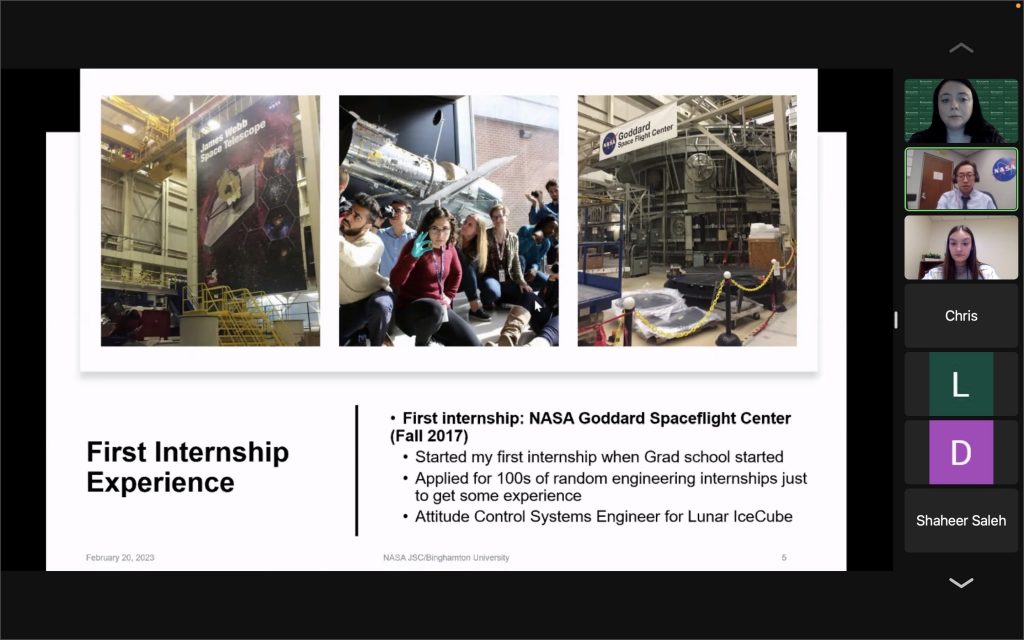National Aeronautics and Space Administration (NASA) aerospace engineer Victor Yu ‘17 MS ‘20 spoke to Binghamton University students this past Monday.
The virtual career session was hosted by Ashley Misuraca, the employer relations coordinator for Watson Career and Alumni Connections. In the session, Yu discussed his personal background, internship experience and how to work at NASA. He acquired a bachelors of science in mechanical engineering in 2017, followed by his masters of science in mechanical engineering in 2020 at BU.
The Zoom session was meant to give students an opportunity to make connections and learn more about NASA, according to Misuraca.
“I wanted students to see that they can really do anything they set their minds to,” Misuraca wrote in an email. “I hope students learned a little more about NASA, all that it has to offer and the networking opportunity that was presented to them. Events such as these are so important, so attending sessions such as this is vital in the learning of opportunities that maybe you didn’t even realize were available. It is always about building your brand and your network and setting yourself up for success in the future.”
Yu explained that during his summers, he participated in multiple research projects that have taught him the skills he uses in his current job. During his time at BU, Yu said he was a part of the Society of Asian Scientists and Engineers (SASE), which he says helped him network. He attended the SASE regional conference to network with aerospace industries, and ended up getting an internship at Collins Aerospace in the summer of 2018.
Yu currently works at the Johnson Space Center located in Houston, Texas as an aerospace engineer in the mission planning team. He stressed the importance of being passionate and curious when entering the workforce, referencing his own networking experience that provided him with the opportunities that led him to his current job.
“So I talked to the branch chief and I told him, ‘Hey, you know I don’t have experience on this, but I really want to learn more about it,’ and he kind of saw that I was really passionate and dedicated to it,” Yu said. “So in the spring of 2019, he offered me an internship job even though he knew that I didn’t have any experience, and it was very worthwhile because I learned a ton of stuff when it comes to orbital mechanics and astrodynamics, so I ended up being an orbital mechanic and trajectory design engineer.”
One tip that Yu shared was to feel comfortable with self-learning. According to Yu, BU did not have an astrodynamics program while he was a student there, prompting him to take a class at Cornell University to learn the science of orbital mechanics. Yu did not receive credit for the course, he explained, but he used the information to self-teach from a textbook.
According to Yu, NASA particularly looks for people with passion, leadership and team-building skills. He stressed that having an internship and experience is more important than having a high GPA when applying to jobs.
“One thing I learned about college is that GPA is only a number,” Yu said. “I wasn’t really a bright student and I didn’t get like 4.0s or 3.7s, but I had research experience, my projects and eventually I had my internship experience, and employers would love seeing those — in fact more than a GPA number. Definitely include your soft and technical skills on your resume.”
Among those who attended the session was Nini Markhvashvilli, a junior majoring in geological sciences. Markhvashvilli commented on what she learned.
“It was very interesting,” Markhvashvili said. “Hearing Victor talk about his experiences and journey to NASA was enlightening. I especially liked the part where he mentioned that it’s important to self-teach yourself.”
Ciara Bellidora, a sophomore majoring in psychology, also attended the session and said the tips and tricks helped her get a better understanding of what is necessary to get hired.
“This session helped me recognize the skills needed to pursue a successful career,” Bellidora said. “Victor shared many tips and tricks so that students could know the best way to get recognized by NASA. I found it very helpful that Victor stressed ideas such as gaining research experience.”



